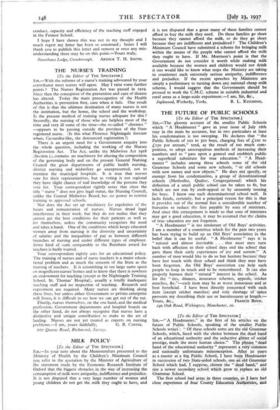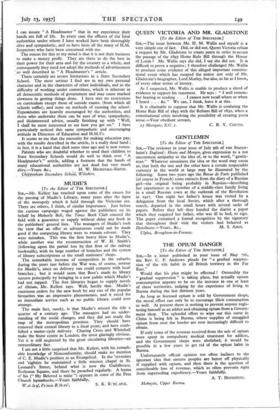[To the Editor of pp ] _SPECTATOR . Sta,—" A . Headmaster,"
in the first of his articles on the fUture of Public Schools, spealun: g . of the smaller Public Schools writes : " Of these schools some are the old Grammar Schools, which, faced with the choice between the, dead hand Of an .educational.authority and the seductive- glitter, of social prestige, made the more human choice." The phrase." dead hand of the educational authority " represents a yery common and nationally Unforninate misconception. after. ;13 years as' a master at .a big PUblic School, I haye been Headmaster in succession of two State-aided schools,.one an old Grammar School. which had, .I suppose, chosen the "dead hand," and one a newer secondary _school whiCh grew to replace an old Grammar Schodl. - The first ichOol had areas-in three counties, so I have had , close experience of four tounty Education Authorities, and I can assure " A Headmaster " that in my experience their hands are full of life. In every case the officers of the local authorities under whom I have worked have been thoroughly alive and sympathetic, and so have been all the many of H.M. Inspectors who have been concerned with me.
The reason for this to my mind is that it is not their business to make a money profit. They are there to do the best in their power for their area and for the country as a whole, and consequently they need not adopt the methods of advertisement so well described in " A Headmaster's " article.
There certainly are severe limitations in a State Secondary School. The most serious I find are in my own personal character and in the characters of other individuals, and in the difficulty of working under committees, which is inherent in all democratic methods of government and may cause marked slowness in getting things done. I have met no restrictions on curriculum except those of outside exams. (from which all schools suffer), and none on methods of running the school. Experiments are heartily encouraged by the authorities, and those who undertake them can be sure of wise, sympathetic, and disinterested advice, usually finishing up with " Well, I shall be most interested to see how you get on." I have particularly noticed this same sympathetic and encouraging attitude in Directors of Education and H.M.I's.
It seems to me that the necessity for making education pay, with the results described in the article, is a really dead hand ; in fact, it is a hand that died some time ago and is now rotten.
Parents who are doubtful whether to send their children to State Secondary Schools would do well to think over " A Headmaster's " article, adding a footnote that the hands of many educational authorities are not dead but very much































































 Previous page
Previous page